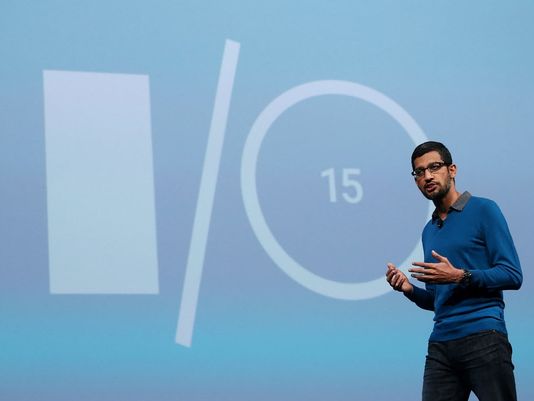
Looking to the future, the next big step will be for the very concept of the “device” to fade away. Over time, the computer itself — whatever its form factor — will be an intelligent assistant helping you through your day. We will move from mobile first to an AI first world.
Recode evaluated the six-point plan presented in the Google Founder’s Letter by CEO Sundar Pichai. The letter is long, which is why I needed Recode to help me see the priceless quote above.
I have been attending Google I/O for some time. This good fortune has been bestowed on me and Digital Scribbler, because Google has a heart for helping those with disabilities. We help the 7.5 million people who are verbally challenged find their voice with Quick Talk and Quick Type AAC (Augmentative Alternative Communication).
What I look forward to when attending Google I/O is their extraordinary capacity for “looking to the future.” Google is signaling and most media outlets agree they are heading toward a deep and narrow focus on Artificial Intelligence, but in my view this is the least important lesson to learn from Google. After all, we have seen Google embrace innumerable focuses, only to drop them when their vision of the future changes (Google Glass Anyone). Search remains but nothing else is ever safe, maybe not even search.
My point is when I attend Google I/O, the most inspiring and rewarding part of the experience is learning how to think. Google knows how to think about the future. Tesla invents, Apple sells, but Google thinks.
When people ask me what Google I/O is like my answer comes easy, but surprises them. I tell them Apple is a company of software engineers. Google is a company of scientist. When listening to the speakers at Google I/O, there is a deep understanding of the science behind their work. This is why their Google I/O developer conference can be difficult for consumers to appreciate.
The products are not the point at Google I/O. Google I/O is about the ideas. When we learn about Artificial Intelligence, or possibly Chrome and Android performing a mind meld, the point won’t be the product. The listener and participant must discover the thinking behind this work…the idea!
Google Glass struggled because too few could understand the idea. Few developers like and superior to me could make Google Glass work (One Exception Stanford Autism Glass Project). Most struggled to grasp the idea. My guess is Google figured out Google Glass, and that is exactly where we are going with Artificial Intelligence.
Regardless of whether you agree or disagree with my Google Glass example, there is more than enough data to confirm my thesis. Google thinks like few companies we have ever seen, and for me, tomorrow is the beginning of my graduate program on the future.
I will be tweeting and posting about Google I/O throughout the week.

